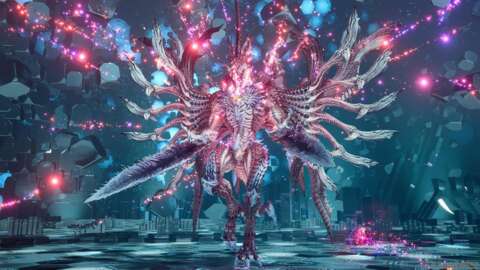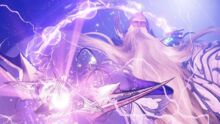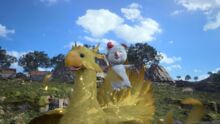Maybe the most impactful thing about returning to the world of Final Fantasy VII for me has been how much its ideas resonate in 2024–many of them even more than they did in 1997. The environmental themes and plotline of FF7 might be exceedingly blunt, but they’re also continually relevant as we live through yet another “hottest year of your life so far.” And after finishing Final Fantasy VII Rebirth, I keep thinking about something else that feels a little too real: the Shinra Electric Power Company.
Shinra is the corporation of cackling villains at the heart of FF7. Much of the story is about how resource extraction for the sake of human progress (with “human progress” often being interchangeable with “greed”) is literally killing the planet, how Shinra are the folks responsible, and how they do not care. More than that, though, is the fact that Shinra is a corporation whose power has grown so immense that it dominates most of the world. It makes and enforces laws, it owns and polices cities, it manufactures weapons and trains soldiers, and it wages wars.
You need a javascript enabled browser to watch videos.
Click To Unmute
ShareSize:640 × 360480 × 270
Want us to remember this setting for all your devices?
Please use a html5 video capable browser to watch videos.
This video has an invalid file format.
00:00:00Sorry, but you can’t access this content!
Please enter your date of birth to view this video
JanuaryFebruaryMarchAprilMayJuneJulyAugustSeptemberOctoberNovemberDecember12345678910111213141516171819202122232425262728293031Year20242023202220212020201920182017201620152014201320122011201020092008200720062005200420032002200120001999199819971996199519941993199219911990198919881987198619851984198319821981198019791978197719761975197419731972197119701969196819671966196519641963196219611960195919581957195619551954195319521951195019491948194719461945194419431942194119401939193819371936193519341933193219311930192919281927192619251924192319221921192019191918191719161915191419131912191119101909190819071906190519041903190219011900
By clicking ‘enter’, you agree to GameSpot's
Terms of Use and
Privacy Policy
Now Playing: The Biggest Changes In Final Fantasy 7 Rebirth
The Shinra of Final Fantasy VII Remake and Rebirth isn’t exactly one-to-one with the corporations of our late-stage capitalist real world (although it is pretty similar to the oil companies that knew about the effects of climate change as far back as the 1970s). But while the concept of an all-powerful corporation felt a bit more out-there in 1997, it’s a lot easier to believe today, when one capricious billionaire owns major global communications networks and wields absolute control over them, another is running for a second stab at the United States presidency while fighting off lawsuits and criminal trials, and many more spend untold millions to elect politicians who will pass policies to reshape the US to their vision.
If Square Enix is looking for more ways to flesh out the Final Fantasy VII universe, FF7 Rebirth gives it a perfect opportunity to do so while also exploring themes and ideas that might be just as impactful as FF7’s environmentalist leanings. Thanks to some subtle expansion of the FF7 lore in Rebirth, Square has opened the door to telling the story of the rise of Shinra–and that’s absolutely a game it should make.
Like Remake before it, Rebirth adds a lot to the Final Fantasy VII story, but one of the more subtle changes is the way it fleshes out the history of the world. You get a few of these tidbits from character dialogue and off-hand references to the way the world used to be, but the most detailed rundowns come from the “world intel” you can uncover by exploring each new area you enter and completing its open-world activities. The clearest look at FF7’s past comes in the Junon region, where you start to get a sense of what the world was like before Shinra took over.
Rebirth starts to tell the story of a world that was largely united under a government called the Republic of Junon. It was founded primarily by sailors, and its capital was a floating city fashioned from a flotilla of ships off the coast of the Junon region. Like Shinra, it originally arose from being a dominant force in trade. From what can be gleaned from the regional backstory, Junon grew to control much of the world, relying on resources like coal and wind to generate electricity.
And then Shinra discovered mako, a volatile but powerful energy source siphoned directly from the lifeforce of the planet, and everything changed.
Though the details are sparse, we know mako earned Shinra a ton of money, and it funneled that money into research. Soon it was creating high-tech weaponry and strong synthetic materials (and eventually, egomaniacal supersoldiers). Mako power and the products it yielded were significantly more useful and more advanced than what was created using traditional resources like coal or the strong mineral mythril. Shinra became so powerful that it went to war with the Republic of Junon, and after protracted fighting, it emerged victorious, with the republic utterly vanquished.
This period, in which Shinra becomes a too-big-to-fail monster of a corporation that begins to rival governments and then replace them, is where Square Enix should focus its FF7 efforts after the third game in the Remake trilogy. What background morsels Rebirth provides paint an incomplete but compelling picture. One lore entry states that soldiers were forcibly conscripted into the war effort from all over the world, although it doesn’t say which side was doing the conscripting or if both were. You talk to one or two people who were around for, and even fought in, the war with Junon, and they give the impression that the republic was maybe not as moral and upstanding as you might first assume, given it was the enemy of Shinra. Then again, though, is that just lingering Shinra propaganda, deployed to turn the people against what sounds like an elected government in favor of a corporatocracy?
We know how things shake out–Shinra destroys the Republic of Junon, sinks its capital, and fills the power vacuum left behind to become the de facto government of much of the world. But there’s plenty of story that could be worth telling within those broad strokes. What if the Republic of Junon was oppressive to the people, and Shinra was able to move in as a heroic savior, for instance? How did a handful of people gather up enough power to take down a republic? Surely there were idealists on both sides, including people who genuinely believed they were doing the right thing fighting for a corporation–who were those people, and what were their experiences like?
The thing about a story delving into the rise of Shinra is that it has a ton of potential to enhance the world of Final Fantasy VII without retreading the same familiar ground. We’ve got plenty of FF7 content about genetically enhanced supersoldiers losing their minds thanks to the unethical meddling of evil scientists and the corporate greed that enables them. This would be an opportunity to tell a political story about regular people in a world speeding toward war at the same time it accelerates through technological progress. It’s easy to imagine a lot of possibilities, bolstered by the strength of much of Rebirth’s storytelling and character development.
What makes the idea so fascinating, though, is that there are a lot of elements that feel close to reality. We live in a world of corporations consolidating more and more power into the hands of a few people with little or no accountability. It’s not a huge stretch to imagine a Shinra coming to power when we’ve got corporations like Nestle, Meta, and Amazon (to name just three) flexing major control over essential resources, services, and infrastructure.
Cyberpunk stories always jump neck-deep into dystopia, positing worlds where capitalism has run so amok that businesses supplant governments, and that’s where we find FF7. What we’re living through now feels more like what comes immediately before the corporate-owned dystopia, where institutions fail or are consciously dismantled and the ever-present push for new ways to make even more money isn’t improving the world, but worsening it. In everything, from internet search engines becoming less and less reliable, to the constant barrage of scams making phones practically unusable, to movies and TV shows being deleted by their owners for tax write-offs, to grocery store companies blaming inflation for price hikes while posting record profits, it feels like the corporate class is exerting more control over everyday life with fewer and fewer means to curtail it.
So a story about the rise of Shinra could be a meaningful one, perfectly positioned to explore the idea of private ownership taking control of the public good. What happens when a company has singular access to how people find trustworthy information, or controls massive amounts of fresh water, or owns essential communications infrastructure? Those are questions we’re answering right now.
Final Fantasy VII Rebirth, like Remake before it, might not be especially subtle about its themes, but the games have done well to expand on the core ideas of FF7–like death, grieving, and mortality–and to explore them in some thoughtful ways. If Square Enix wants to continue its Compilation of Final Fantasy VII, the backstory of the Republic of Junon provides new space to do it, while expanding the life and detail of what has become a fascinating world. Most of all, though, this is another chance for the world of Final Fantasy VII to tell stories that reflect reality, and become more resonant and meaningful because of it.
Final Fantasy 7 Rebirth – All Summons Guide





 See More
See More




